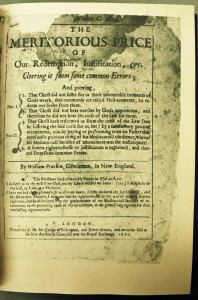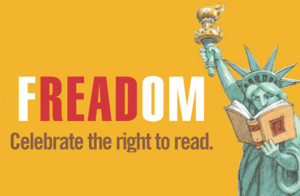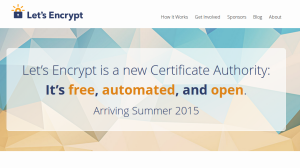The first book banned and burned in the New World was published in London in 1650: William Pynchon’s “The Meritorious Price of Our Redemption,†a critique of Puritanism.
Mr. Pynchon, a Puritan living in Massachusetts Bay Colony, found little welcome for his views and was eventually forced to return to England.
Fast forward three centuries, and there were about 300 cases of attempted censorship reported in 1980, the library group says.
Monthly Archives: September 2015
It is Banned Books Week, 2015. Refresh your Recollection on your ‘Freedom to Read’ via ALA’s The Freedom to Read Statement
The freedom to read is essential to our democracy. It is continuously under attack. Private groups and public authorities in various parts of the country are working to remove or limit access to reading materials, to censor content in schools, to label “controversial” views, to distribute lists of “objectionable” books or authors, and to purge libraries. These actions apparently rise from a view that our national tradition of free expression is no longer valid; that censorship and suppression are needed to counter threats to safety or national security, as well as to avoid the subversion of politics and the corruption of morals. We, as individuals devoted to reading and as librarians and publishers responsible for disseminating ideas, wish to assert the public interest in the preservation of the freedom to read.
Source: The Freedom to Read Statement | Advocacy, Legislation & Issues
» ALA’s Office for Intellectual Freedom announces sponsorship of Let’s Encrypt initiativeÂ
The American Library Association’s Office for Intellectual Freedom announced its sponsorship of “Let’s Encrypt,†a free, automated, and open certificate authority. “Let’s Encrypt†is a service provided by the Internet Security Research Group (ISRG) and is run for the public’s benefit. It will allow anyone who owns a domain name – including libraries – to obtain a server certificate at zero cost, making it possible to encrypt data communications between servers and provide greater security for those using the internet for email, browsing, or other online tasks.
Offline : Imprisoned Bloggers and Technologists (via Electronic Frontier Foundation)
The number of individuals in prison around the world for raising their voices online is on the rise. In 2014, the Committee to Protect Journalists found that over half of imprisoned journalists were arrested for activities conducted on the Internet. In a 2015 report, Reporters Without Borders cited 178 incidents of imprisoned “netizens†in just a selection of twelve countries. Now that individuals can speak up without the need for institutions or gatekeepers, states choose the most direct way to take away their power: incarcerating them, and taking them offline.
It’s not just those who speak out who are sent to jail. Increasingly, EFF has seen coders, designers, makers, and hackers detained or threatened with prison for their work protecting or enhancing free expression and privacy. Writers, speakers, and journalists have long been understood by those in power as dangerous elements; now “technologist†has joined the list of occupations that corrupt politicians and dictators fear.
EFF supports the principles of free expression laid out in Article 19 of the Universal Declaration of Human Rights and believes that those principles must extend online. The right “to seek, receive and impart information†includes a right to devise and share tools that enable and protect those abilities.
“Offline†showcases key cases that may not be receiving wide coverage, but we believe speak to a wider audience concerned with online freedom. Our international case advocacy is centered around awareness-raising. Over the years, we have often heard from those who have been released from detention that shining a spotlight on their case led to better treatment in prison or a speedier release. It is from this premise that we work, additionally ensuring that we have full support of an individual’s loved ones before we proceed with action.
[…]
Source: Offline : Imprisoned Bloggers and Technologists | Electronic Frontier Foundation
The Genius of Learning: An Illustrated Look Inside Danielle Bassett’s Neurology Lab
Lauren R. Weinstein is a cartoonist based in New Jersey. She is currently working on a graphic novel tentatively entitled How to…
Source: An Illustrated Look Inside MacArthur “Genius†Danielle Bassett’s Neurology Lab


